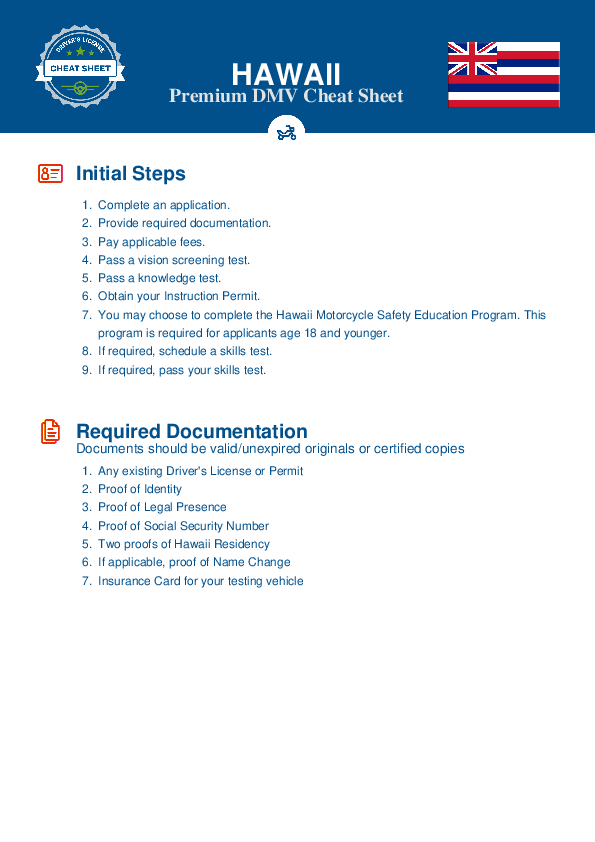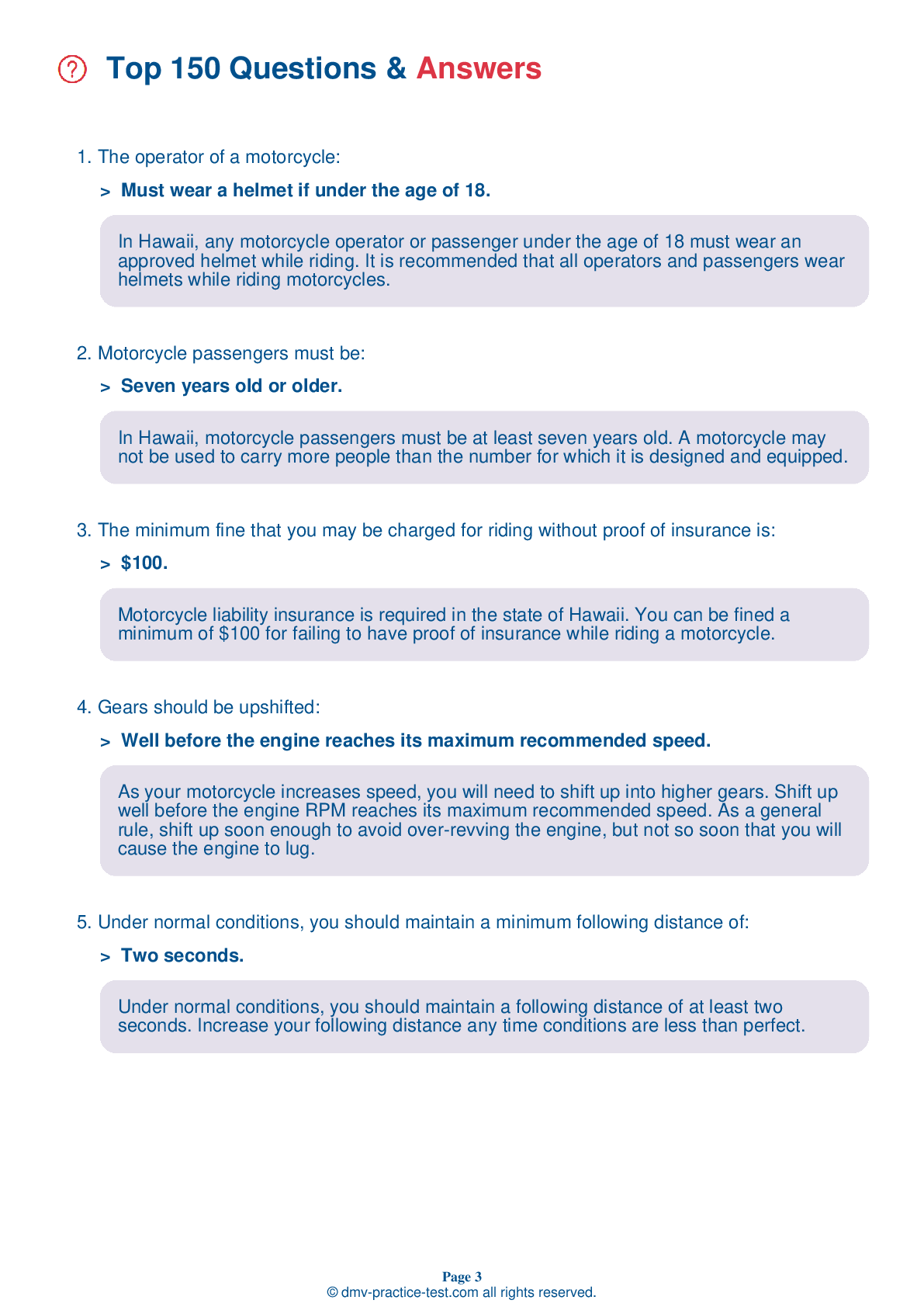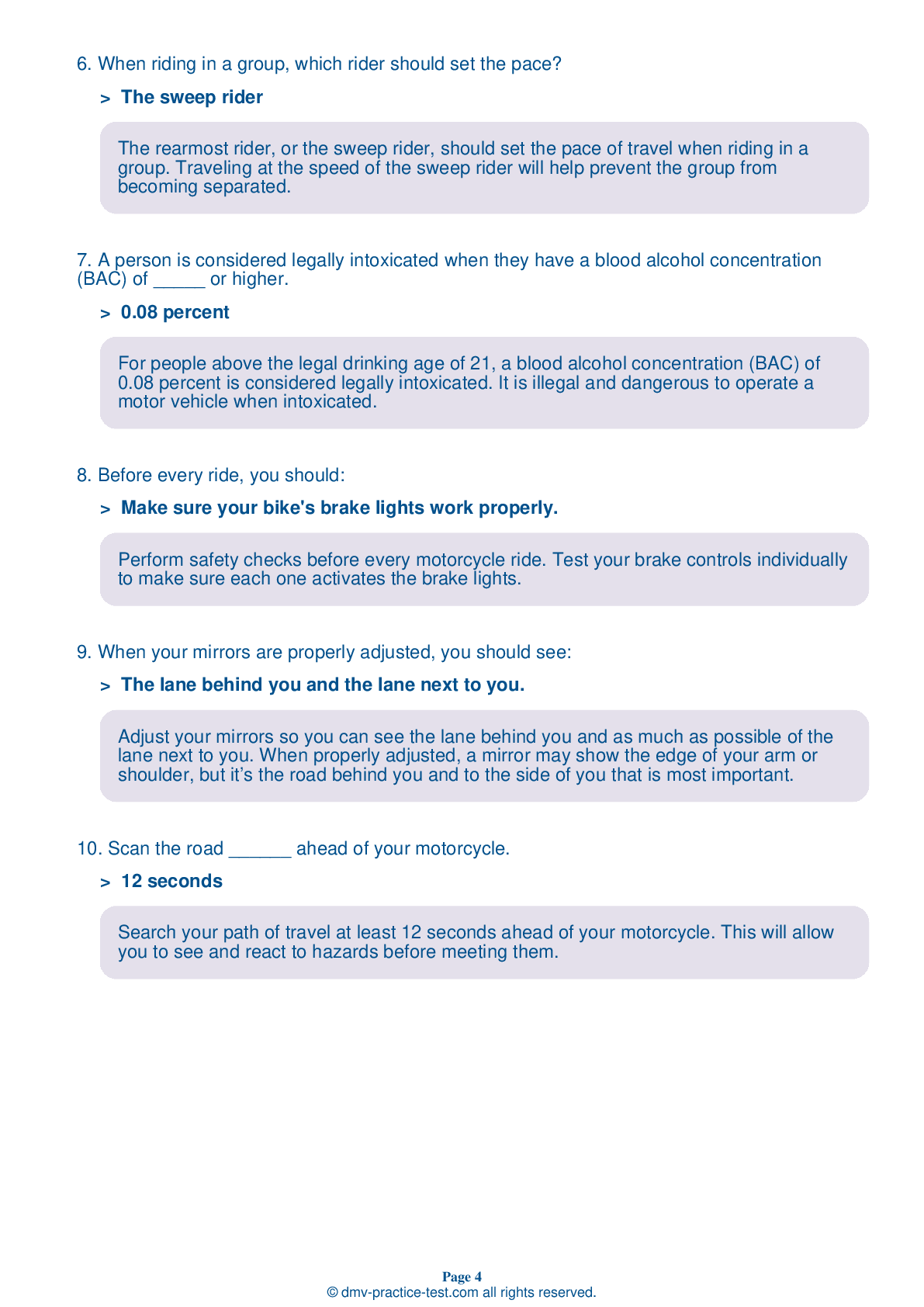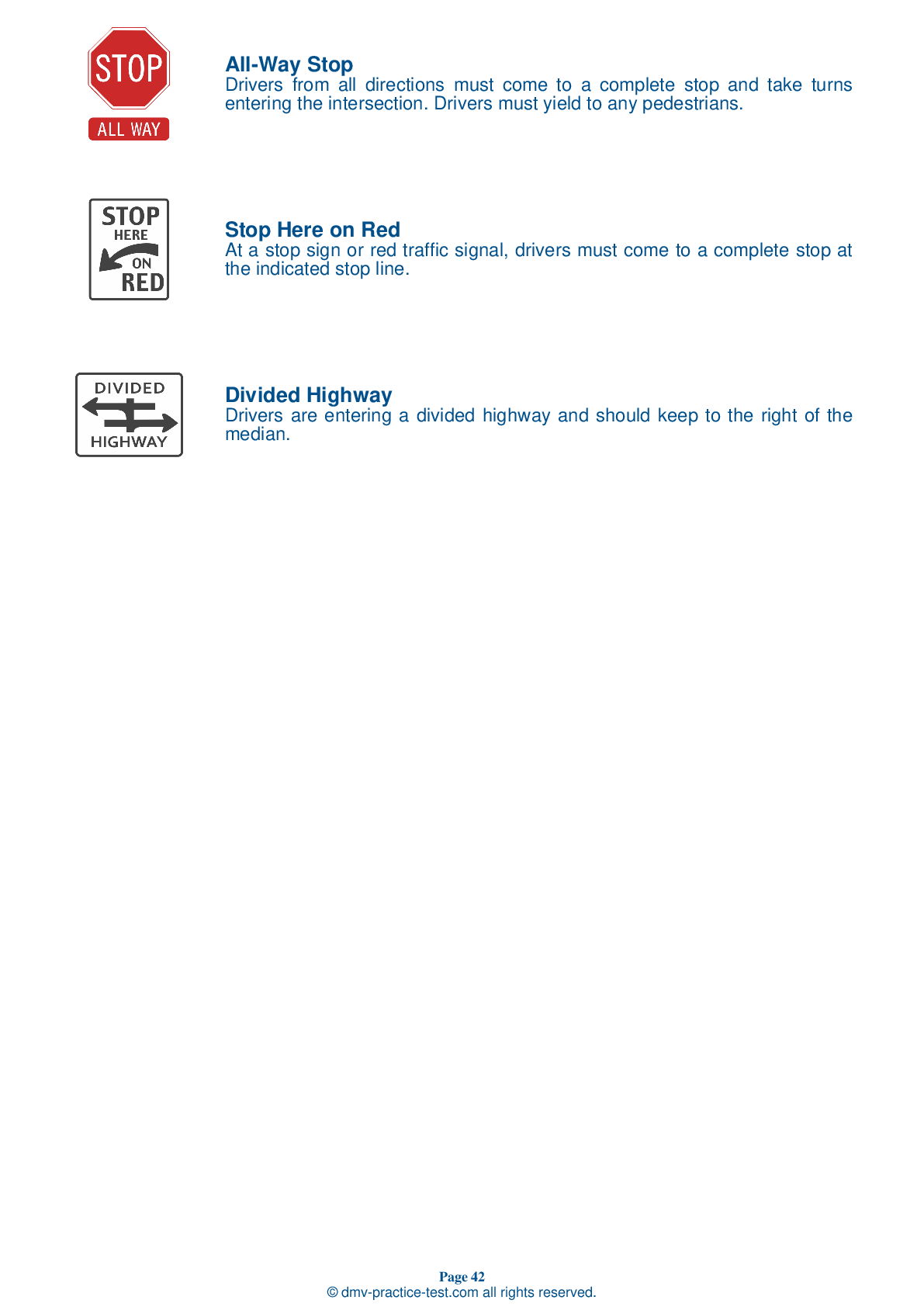DMV Permit Test #13
Motorcycle Test | License HI 2025 | FREE Online Practice! #13
Take this FREE motorcycle test (license in HI 2025) to check your knowledge of the road rules. To improve your results, download a motorcycle handbook online, study theory, and practice for free on our website. Still worried about how to get a motorcycle license in Hawaii in 2025? Check our website for more sample tests, train as much as possible, and boost your grades!
25
20
16
1 . If a friend has been drinking alcohol and wants to drive, which of the following should you not do?
Slow their pace of drinking.
There are several strategies you can use to prevent someone from driving while under the influence of alcohol. You can arrange another way for them to get home, involve them in other activities to slow their pace of drinking, use any available excuse to stop them from leaving before they are sober, and get other friends involved to intervene as a group.
2 . How can you discourage another vehicle from sharing your lane?
Swerve from side to side in your lane.
To discourage automobile drivers from trying to share your lane, ride in the center portion of the lane.
3 . To prevent fatigue on long rides, a rider should:
Dress warmly.
To reduce the risk of fatigue on a long trip, dress to protect yourself against heat, rain, wind, or snow. Limit yourself to no more than about six hours of riding per day, and stop to rest at least once every two hours. Avoid consuming artificial stimulants, as you may experience extreme fatigue when they begin to wear off.
4 . When riding in a staggered formation, the third rider in the group should ride _______ behind the leader.
Four seconds
In a staggered formation, the lead rider should ride on the left side of the lane, with the second rider one second behind on the right side of the lane. The third rider should be on the left side of the lane, two seconds behind the lead rider.
5 . To swerve correctly:
Press the handgrip in the direction opposite of the turn.
To execute a swerve, press the handgrip on the side of your desired turn. Press on the opposite handgrip to return to your original direction after you are clear of the hazard.
6 . Most crashes occur during the day. To lessen the chance of being involved in a crash, you should:
Look for safer routes.
To minimize your chances of being in a crash, you should make yourself as visible as possible by wearing brightly-colored clothing when riding, even during the day.
2025 Hawaii | Frequently Asked Questions
To acquire a motorcycle license in Hawaii, you must first obtain a motorcycle instruction permit by passing a written test. Then, you need to complete a state-approved motorcycle education course. After holding the permit for 90 days and demonstrating competent motorcycle operation, you can then apply for a motorcycle license and take the required road test.
The minimum age to apply for a motorcycle license in Hawaii is 18. However, if you are 15-17 years old, you can apply for a motorcycle instruction permit after passing a written test. With this permit, you can practice driving under certain restrictions before taking the road skills test for the full motorcycle license after turning 18.
Yes, you do need a dedicated license for motorcycle riding. In Hawaii, this is called a Class 2 license. To obtain this, you must already hold a regular driver's license, pass a written test for a motorcycle instruction permit, and then pass a skills test. This ensures you have the necessary knowledge and skills for safe motorcycle operation.
To apply for a motorcycle driver's license in Hawaii, you'll need several documents. These include proof of identity (like a birth certificate or passport), proof of social security number, and proof of legal presence in the U.S. If you're a Hawaii resident, you'll also need two documents proving your residency. Lastly, if applicable, bring your current driver's license.
Yes, you will need to take a written exam to get a motorcycle license in Hawaii. This test assesses your knowledge of motorcycle operation, traffic laws, and safety rules. Passing this test is required to receive your permit. After obtaining your permit and completing a hands-on skills test, you'll be eligible for a full motorcycle license.
The written motorcycle test in Hawaii covers various subjects related to motorcycle operation and safety. This includes knowledge on traffic laws, road signs, safe riding techniques, and handling emergency situations. Additionally, it will test your understanding of motorcycle-specific rules, like helmet laws and lane sharing regulations. Studying the Hawaii Motorcycle Operator Manual is recommended to prepare for the test.
No, you cannot substitute the written test with a motorcycle training course in Hawaii. The written test is a mandatory requirement to obtain a motorcycle license. However, a training course can help prepare you for the test, and in some cases, completion of a certified course might waive the practical riding exam.
To enroll in a motorcycle training course in Hawaii, you first need to find a state-approved motorcycle education provider. You can do this online or by contacting the Hawaii Department of Transportation. Once you've chosen a provider, you can register for a course either online or in person. The course typically includes both classroom instruction and practical riding exercises.
No, you don't necessarily need to own a motorcycle for the license test in Hawaii. You can use a friend's motorcycle as long as it's registered, insured and you have permission to use it. However, it must meet all safety standards and be appropriate for the class of license you're applying for.
Yes, you can use a friend's motorcycle for the driver's license evaluation in Hawaii. However, the motorcycle must be in good working condition, properly registered and insured. Also, the size of the motorcycle should be appropriate for your physical stature and you must show that you can handle it safely.
Yes, during the driving exam in Hawaii, motorcycle handling skills like starting and stopping, turning and swerving, quick stops, and obstacle avoidance are tested. Also, proper use of signals and understanding of traffic signs are assessed. The test ensures the rider's ability to safely operate a motorcycle under typical road conditions.
Yes, Hawaii imposes certain restrictions on new motorcycle drivers under the age of 18. They must complete a motorcycle education course and hold a motorcycle instruction permit for 90 days before obtaining a license. Additionally, they are not allowed to carry passengers, and must not drive between the hours of 11 pm and 5 am unless for work or school purposes.
Yes, your Hawaii motorcycle license is valid across all 50 states due to the Full Faith and Credit Clause of the U.S. Constitution, which requires states to honor the "public acts, records, and judicial proceedings" of other states. However, you must follow the specific traffic laws of each state you are in, including helmet and insurance requirements.
In Hawaii, all motorcycle operators under the age of 18 are required by law to wear a helmet. For those 18 and older, wearing a helmet is not mandatory but is highly recommended for safety. However, all riders, regardless of age, must wear protective eyewear unless their motorcycle is equipped with a windscreen.
Yes, Hawaii offers two types of motorcycle licenses. A Class 2 license allows you to operate any motorcycle or motor scooter. A Class 1 license allows you to operate mopeds only. The requirements for these licenses differ slightly, with the Class 2 license requiring a more comprehensive skills test due to the larger size and complexity of the vehicles it covers.
Yes, you can add supplementary endorsements to your motorcycle license in Hawaii. This allows you to operate additional types of vehicles. The most common endorsement is the "2M" for motorcycles. To add an endorsement, you typically need to pass both a written and skills test. The specific requirements may vary, so check with the local DMV for detailed information.
Yes, it is possible to take the motorcycle license test in Hawaii in languages other than English. The test is offered in several languages, including Chinese, Japanese, Korean, Vietnamese, Tagalog, Samoan, Tongan, Ilocano and Chuukese. This helps to accommodate a diverse range of applicants and ensure they understand the safety rules and regulations.
The most effective strategy to prepare for the motorcycle license test is to study the Hawaii Motorcycle Operator Manual thoroughly. It covers all the information you need, from road rules to safety regulations. Practice tests are also beneficial as they help familiarize you with the format and type of questions on the actual exam. It's also advisable to take a motorcycle safety course.
Yes, in Hawaii, the motorcycle written exam can be taken in languages other than English. The Department of Transportation offers the exam in several languages including Tagalog, Japanese, Chinese, Korean, Vietnamese, Samoan, Tongan, and Ilocano. Please contact your local DMV office to confirm language availability.
If you don't pass the motorcycle written test in Hawaii, you are allowed to retake it. However, there might be a waiting period before you can retake the test, and additional fees may apply. It's advisable to study thoroughly using the Hawaii Motorcycle Operator Manual to increase your chances of passing on the next attempt.



